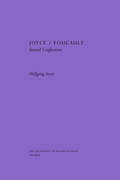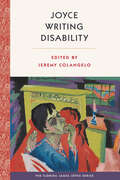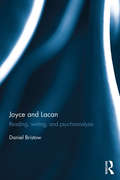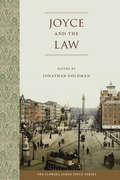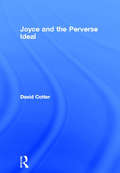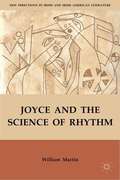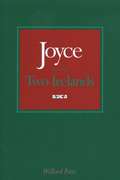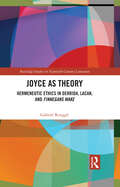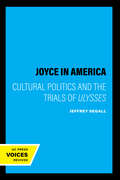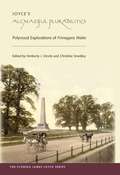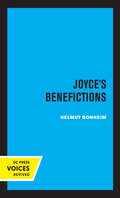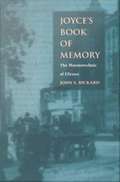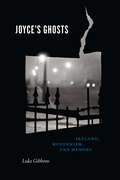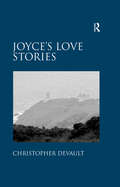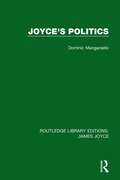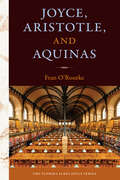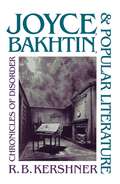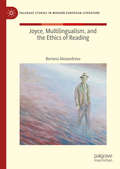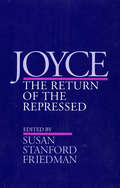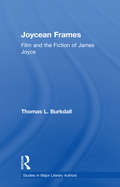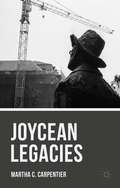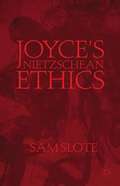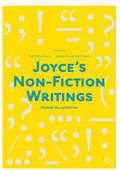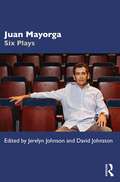- Table View
- List View
Joyce / Foucault
by Wolfgang StreitSheds new light on James Joyce's use of sexual motifs as cultural raw material for Ulysses and other works Joyce/Foucault: Sexual Confessions examines instances of sexual confession in works of James Joyce, with a special emphasis on Portrait of the Artist as a Young Man and Ulysses. Using Michel Foucault's historical analysis of Western sexuality as its theoretical underpinning, the book foregrounds the role of the Jesuit order in the spread of a confessional force, and finds this influence inscribed into Joyce's major texts. Wolfgang Streit goes on to argue that the tension between the texts' erotic passages and Joyce's criticism of even his own sexual writing energizes Joyce's narratives-and enables Joyce to develop the radical skepticism of power revealed in his work.
Joyce Writing Disability (The Florida James Joyce Series)
by Jeremy ColangeloIn this book, the first to explore the role of disability in the writings of James Joyce, contributors approach the subject both on a figurative level, as a symbol or metaphor in Joyce’s work, and also as a physical reality for many of Joyce’s characters. Contributors examine the varying ways in which Joyce’s texts represent disability and the environmental conditions of his time that stigmatized, isolated, and othered individuals with disabilities. The collection demonstrates the centrality of the body and embodiment in Joyce’s writings, from Dubliners and A Portrait of the Artist as a Young Man to Ulysses and Finnegans Wake. Essays address Joyce’s engagement with paralysis, masculinity, childhood violence, trauma, disorderly eating, blindness, nineteenth-century theories of degeneration, and the concept of “madness.” Together, the essays offer examples of Joyce’s interest in the complexities of human existence and in challenging assumptions about bodily and mental norms. Complete with an introduction that summarizes key disability studies concepts and the current state of research on the subject in Joyce studies, this volume is a valuable resource for disability scholars interested in modernist literature and an ideal starting point for any Joycean new to the study of disability. A volume in the Florida James Joyce Series, edited by Sebastian D. G. Knowles
Joyce and Lacan: Reading, Writing and Psychoanalysis
by Daniel BristowWhat happens when the intellectual giant of twentieth-century literature, James Joyce, is made an object of consideration and cause of desire by the intellectual giant of modern psychoanalysis, Jacques Lacan? This is what Joyce and Lacan explores, in the three closely interrelated areas of reading, writing, and psychoanalysis, by delving into Joyce’s own relationship with psychoanalysis in his lifetime. The book concentrates primarily on his last text, Finnegans Wake, the notorious difficulty of which arises from its challenging the intellect itself, and our own processes of reading. As well as the centrality of the Wake, concepts of Joycean ontology, sanity, singularity, and sexuality are excavated from sustained analysis of his earliest writings onward. To be ‘post-Joycean’, as Lacan describes it, means then to be in the wake not only of Joyce, but also of Lacan’s interventions on the Irish writer made in the mid-70s. It was this encounter that gave rise to concepts that have gained currency in today’s psychoanalytic theory and practice, and importance in wider critical contexts. The notions of the sinthome, lalangue, and Lacan’s use of topology and knot theory are explored within, as well as new theories being launched. The book will be of interest to psychoanalysts, literary theorists, and students and teachers of literature, theory, or the works of Joyce and Lacan.
Joyce and the Law (The Florida James Joyce Series)
by Jonathan GoldmanMaking the case that legal issues are central to James Joyce’s life and work, international experts in law and literature offer new insights into Joyce’s most important texts. They analyze Dubliners, A Portrait of the Artist as a Young Man, Giacomo Joyce, Ulysses, and Finnegans Wake in light of the legal contexts of Joyce’s day. Topics include marriage laws, the Aliens Act of 1905, laws governing display and use of language, minority rights debates, municipal self-government, rentier culture, and regulations on alcohol consumption and licensing. This volume also highlights Joyce’s own fascination with law and legal inquiry and explores how, by adopting a unique visual and linguistic style, Joyce constructed an authorial identity that mirrored the process of trademark. It also offers a deeper understanding of Judge John Woolsey’s decision in the Ulysses obscenity case and reveals the many ways copyright has affected publication of Joyce’s work and the scholarly and aesthetic use of his words. These discussions show how reading Joyce alongside the law enriches both legal studies and literary scholarship. A volume in the Florida James Joyce Series, edited by Sebastian D. G. Knowles
Joyce and the Perverse Ideal (Studies in Major Literary Authors)
by David CotterRepresentations of masochism - both overt and oblique - permeate the work of James Joyce. While a number of critics have noted this, to date there has been no sustained and focused analysis of this trope in his writings. David Cotter argues that such an examination is key to understanding the meanings and messages of Joyce's work. Adding further dimensions to moral, political and aesthetic considerations in the novels and stories - particularly Ulysses - this book provides a comprehensive account of masochistic elements in James Joyce's work. Cotter draws upon psychoanalytic theory and social history to illustrate the subversive power of perversity in the literature of the modern period. This edition first Published in 2003. Routledge is an imprint of Taylor & Francis, an informa company.
Joyce and the Science of Rhythm
by William MartinThis book situates Joyce's critical writings within the context of an emerging discourse on the psychology of rhythm, suggesting that A Portrait of the Artist dramatizes the experience of rhythm as the subject matter of the modernist novel. Including comparative analyses of the lyrical prose of Virginia Woolf and the 'cadences' of the Imagists, Martin outlines a new concept of the 'modern period' that describes the interaction between poetry and prose in the literature of the early twentieth century.
Joyce and the Two Irelands
by Willard PottsUniting Catholic Ireland and Protestant Ireland was a central idea of the "Irish Revival," a literary and cultural manifestation of Irish nationalism that began in the 1890s and continued into the early twentieth century. Yet many of the Revival's Protestant leaders, including W. B. Yeats, Lady Gregory, and John Synge, failed to address the profound cultural differences that made uniting the two Irelands so problematic, while Catholic leaders of the Revival, particularly the journalist D. P. Moran, turned the movement into a struggle for greater Catholic power.<P><P>This book fully explores James Joyce's complex response to the Irish Revival and his extensive treatment of the relationship between the "two Irelands" in his letters, essays, book reviews, and fiction up to Finnegans Wake. Willard Potts skillfully demonstrates that, despite his pretense of being an aloof onlooker, Joyce was very much a part of the Revival. He shows how deeply Joyce was steeped in his whole Catholic culture and how, regardless of the harsh way he treats the Catholic characters in his works, he almost always portrays them as superior to any Protestants with whom they appear. This research recovers the historical and cultural roots of a writer who is too often studied in isolation from the Irish world that formed him.
Joyce as Theory: Hermeneutic Ethics in Derrida, Lacan, and Finnegans Wake (Routledge Studies in Twentieth-Century Literature)
by Gabriel RenggliJoyce as Theory is the first study to argue James Joyce can be read as a theorist. Joyce is not just a favourite case study of literary theory; he wrote about how we make meaning, and to what effect. The present volume traces his hermeneutics in those narratives in Finnegans Wake which deal with textual production and interpretation, showing that the Wake’s difficulty exemplifies Joyce’s theoretical stance. All reading involves responding to problems we cannot quite fathom. This preoccupation places Joyce alongside Jacques Derrida and Jacques Lacan. Joyce as Theory revives debates on theory with a linguistic focus, laying open misconceptions that have muddled attempts to be over and done with this kind of thought. It demonstrates that Derrida and Lacan, almost exclusively presented as rivals, converge on a common position. It opposes the myth of linguistic theory as a formalist approach, instead showing that Joyce, Derrida, and Lacan give us a hermeneutic ethics alert to how meaning-making impacts our lived experience. And it challenges the notion that theory imposes matters alien to Joyce, demonstrating that it is an appreciation of Joyce’s arguments in Finnegans Wake that generates a theoretical perspective. Joyce as Theory is essential reading for researchers and students in Joyce studies, continental philosophy, literary theory, and modernist literature.
Joyce in America: Cultural Politics and the Trials of <i>Ulysses</i>
by Jeffrey SegallWhen James Joyce's Ulysses was first published in America, it quickly became a dynamic symbol of both modern art and the modern age. Jeffrey Segall skillfully demonstrates how various political, ideological, and religious allegiances influenced the critical reception and eventual canonization of what is perhaps the twentieth century's greatest novel.In re-creating the polemical debates that erupted, Segall provides a dramatic reminder of just how challenging and controversial Ulysses was—and is. Seventy years after Ulysses was first banned, the novel remains at the center of contemporary debates among feminist, neo-Marxist, and poststructuralist critics.Segall allows us the opportunity to view Ulysses from the perspective of its early readers, and he also elucidates key moments in recent American cultural history.
Joyce's Allmaziful Plurabilities: Polyvocal Explorations of Finnegans Wake (Florida James Joyce)
by Kimberly J. Devlin Christine Smedley“A brilliantly collaged snapshot of the variety and wealth of literary criticism, and Joyce studies, today.”—Tony Thwaites, author of Joycean Temporalities “Celebrates the multiplicity and sheer rampant excess of Joyce’s prodigally polysemous text with seventeen different scholars employing a likewise prodigal range of critical methodologies.”—Patrick O’Neill, author of Impossible Joyce: Finnegans Wakes “Each of the scholars involved is at the top of his and her game. Their commitment and excitement about the task at hand is evident on virtually every page. This book makes the Wake relevant and accessible to a whole new generation of readers.”—Garry Leonard, author of Advertising and Commodity Culture in Joyce This is the first Finnegans Wake guide to focus exclusively on the multiple meanings and voices in Joyce’s notoriously intricate diction. Rather than leveling the text it illuminates many layers of puns, wordplay, and portmanteaus, celebrating the Wake’s central experimental technique. Renowned Joyce scholars explore the polyvocality of individual chapters using game theory, ecocriticism, psychoanalysis, historicism, myth, philosophy, genetic studies, feminism, and other critical frameworks. They set in motion cross-currents and radiating structures of meaning that permeate the entire text and open up satisfying readings of the Wake for novices and seasoned readers alike. A volume in the Florida James Joyce Series, edited by Sebastian D. G. Knowles
Joyce's Benefictions: Perspectives in Criticism (Perspectives in Criticism #16)
by Helmut BonheimThis title is part of UC Press's Voices Revived program, which commemorates University of California Press’s mission to seek out and cultivate the brightest minds and give them voice, reach, and impact. Drawing on a backlist dating to 1893, Voices Revived makes high-quality, peer-reviewed scholarship accessible once again using print-on-demand technology. This title was originally published in 1964.
Joyce's Book of Memory: The Mnemotechnic of Ulysses
by John S. RickardFor James Joyce, perhaps the most crucial of all human faculties was memory. It represented both the central thread of identity and a looking glass into the past. It served as an avenue into other minds, an essential part of the process of literary composition and narration, and the connective tissue of cultural tradition. In Joyce's Book of Memory John S. Rickard demonstrates how Joyce's body of work--Ulysses in particular--operates as a "mnemotechnic," a technique for preserving and remembering personal, social, and cultural pasts. Offering a detailed reading of Joyce and his methods of writing, Rickard investigates the uses of memory in Ulysses and analyzes its role in the formation of personal identity. The importance of forgetting and repression, and the deadliness of nostalgia and habit in Joyce's paralyzed Dublin are also revealed. Noting the power of spontaneous, involuntary recollection, Rickard locates Joyce's mnemotechnic within its historical and philosophical contexts. As he examines how Joyce responded to competing intellectual paradigms, Rickard explores Ulysses' connection to medieval, modern, and (what would become) postmodern worldviews, as well as its display of tensions between notions of subjective and universal memory. Finally, Joyce's Book of Memory illustrates how Joyce distilled subjectivity, history, and cultural identity into a text that offers a panoramic view of the modern period. This book will interest students and scholars of Joyce, as well as others engaged in the study of modern and postmodern literature.
Joyce's Ghosts: Ireland, Modernism, and Memory
by Luke GibbonsFor decades, James Joyce's modernism has overshadowed his Irishness, as his self-imposed exile and association with the high modernism of Europe's urban centers has led critics to see him almost exclusively as a cosmopolitan figure. In Joyce's Ghosts, Luke Gibbons mounts a powerful argument that this view is mistaken: Joyce's Irishness is intrinsic to his modernism, informing his most distinctive literary experiments. Ireland, Gibbons shows, is not just a source of subject matter or content for Joyce, but of form itself. Joyce's stylistic innovations can be traced at least as much to the tragedies of Irish history as to the shock of European modernity, as he explores the incomplete project of inner life under colonialism. Joyce's language, Gibbons reveals, is haunted by ghosts, less concerned with the stream of consciousness than with a vernacular interior dialogue, the "shout in the street," that gives room to outside voices and shadowy presences, the disruptions of a late colonial culture in crisis. Showing us how memory under modernism breaks free of the nightmare of history, and how in doing so it gives birth to new forms, Gibbons forces us to think anew about Joyce's achievement and its foundations.
Joyce's Love Stories
by Christopher DeVaultIn his comprehensive study of love in James Joyce's writings, Christopher DeVault suggests that a love ethic persists throughout Joyce's works. DeVault uses Martin Buber's distinction between the true love for others and the narcissistic desire for oneself to frame his discussion, showing that Joyce frequently ties his characters' personal and political pursuits to their ability to affirm both their loved ones and their fellow Dubliners. In his short stories and novels, DeVault argues, Joyce shows how personal love makes possible a broader social compassion that creates a more progressive body politic. While his early protagonists' narcissism limits them to detached engagements with Dublin that impede effective political action, Joyce demonstrates the viability of his love ethic through both the Blooms’ empathy in Ulysses and the polylogic dreamtext of Finnegan's Wake. In its revelation of Joyce's amorous alternative to the social and political paralysis he famously attributed to twentieth-century Dublin, Joyce's Love Stories allows for a better appreciation of the ethical and political significance underpinning the author's assessments of Ireland.
Joyce's Politics (Routledge Library Editions: James Joyce #5)
by Dominic ManganielloThe object of this study, first published in 1980, is to dispel the view that James Joyce had no political views. Although not a political novelist like D. H. Lawrence or Joseph Conrad, political issues and discussions are central to Joyce’s major novels. This title links that political content with Joyce’s own views, and examines the evolution of those views and attitudes. A number of unusual and fascinating sources for Joyce’s thought are uncovered. Joyce’s Politics is thus a thorough review of a neglected aspect of Joyce and his writings, and will be of interest to students of literature.
Joyce, Aristotle, and Aquinas (The Florida James Joyce Series)
by Fran O'RourkeA rich examination of the influence of Aristotle and Thomas Aquinas on James Joyce In this book, Fran O’Rourke examines the influence of Aristotle and Thomas Aquinas on James Joyce, arguing that both thinkers fundamentally shaped the philosophical outlook which pervades the author’s oeuvre. O’Rourke demonstrates that Joyce was a philosophical writer who engaged creatively with questions of diversity and unity, identity, permanence and change, and the reliability of knowledge. Beginning with an introduction to each thinker, the book traces Joyce’s discovery of their works and his concrete engagement with their thought. Aristotle and Aquinas equipped Joyce with fundamental principles regarding reality, knowledge, and the soul, which allowed him to shape his literary characters. Joyce appropriated Thomistic concepts to elaborate an original and personal aesthetic theory. O’Rourke provides an annotated commentary on quotations from Aristotle that Joyce entered into his famous Early Commonplace Book and outlines their crucial significance for his writings. He also provides an authoritative evaluation of Joyce’s application of Aquinas’s aesthetic principles. The first book to comprehensively illuminate the profound impact of both the ancient and medieval thinker on the modernist writer, Joyce, Aristotle, and Aquinas offers readers a rich understanding of the intellectual background and philosophical underpinnings of Joyce’s work. A volume in the Florida James Joyce Series, edited by Sebastian D. G. Knowles
Joyce, Bakhtin, and Popular Literature
by R. B. KershnerThe sheer mass of allusion to popular literature in the writings of James Joyce is daunting. Using theories developed by Russian critic Mikhail Bakhtin, R. B. Kershner analyzes how Joyce made use of popular literature in such early works as Stephen Hero, Dubliners, A Portrait of an Artist as a Young Man, and Exiles. Kershner also examines Joyce's use of rhetoric, the relationship between narrator and protagonist, and the interplay of voices, whether personal, literary, or subliterary, in Joyce's writing.In pointing out the prolific allusions in Joyce to newspapers, children's books, popular novels, and even pornography, Kershner shows how each of these contributes to the structures of consciousness of Joyce's various characters, all of whom write and rewrite themselves in terms of the texts they read in their youth. He also investigates the intertextual role of many popular books to which Joyce alludes in his writings and letters, or which he owned -- some well known, others now obscure.Kershner presents Joyce as a writer with a high degrees of social consciousness, whose writings highlight the conflicting ideologies of the Irish bourgeoisie. In exploring the social dimension of Joyce's writing, he calls upon such important contemporary thinkers as Jameston, Althusser, Barthes, and Lacan in addition to Bakhtin. Joyce's literary response to his historical situation was not polemical, Kershner argues, but, in Bakhtin's terms, dialogical: his writings represent an unremitting dialogue with the discordant but powerful voices of his day, many inaudible to us now.Joyce, Bakhtin, and Popular Literature places Joyce within the social and intellectual context of his time. Through stylistic, social, and ideological analysis, Kersner gives us a fuller grasp of the the complexity of Joyce's earlier writings.
Joyce, Multilingualism, and the Ethics of Reading: Deplurabel Muttertongues (Palgrave Studies in Modern European Literature)
by Boriana AlexandrovaWhat if our notions of the nation as a site of belonging, the home as a safe place, or the mother tongue as a means to fluent comprehension did not apply? What if fluency were a hindrance, whilst our differences and contradictions held the keys to radical new ways of knowing? Taking inspiration from the practice of language learning and translation, this book explores the extraordinary creative possibilities, politics, and ethics of adopting a multilingual approach to reading. Its case study, James Joyce’s Finnegans Wake (1939), is a text in equal measures exhilarating and exasperating: an unhinged portrait of European modernist debates on transculturalism and globalisation, here considered on the backdrop of current discourses on migration, race, gender, and neurodiversity. This book offers a fresh perspective on the illuminating, if perplexing, work of a beloved European modernist, whilst posing questions far beyond Joyce: on negotiating difference in an increasingly globalised world; on braving the difficulty of relating across languages and cultures; and ultimately on imagining possible futures where multilingual literature can empower us to read, relate, and conceptualise differently.
Joyce: The Return of the Repressed
Did James Joyce, that icon of modernity, spearhead the dismantling of the Cartesian subject? Or was he a supreme example of a modern man forever divided and never fully known to himself? This volume reads the dialogue of contradictory cultural voices in Joyce’s works—revolutionary and reactionary, critical and subject to critique, marginal and central. It includes ten essays that identify repressed elements in Joyce’s writings and examine how psychic and cultural repressions persistently surface in his texts. Contributors include Joseph A. Boone, Marilyn L. Brownstein, Jay Clayton, Laura Doyle, Susan Stanford Friedman, Christine Froula, Ellen Carol Jones, Alberto Moreirias, Richard Pearce, and Robert Spoo.
Joycean Frames: Film and the Fiction of James Joyce (Studies in Major Literary Authors)
by Thomas BurkdallEmploying concepts from film theory, this much-needed study explores in-depth the "cinematic" quality of James Joyce's fiction from Dubliners to Finnegan's Wake.
Joycean Legacies
by Martha C. CarpentierThe primary focus of the twelve essays in this collection is on the craft of James Joyce and the profound challenge it has posed for subsequent writers from the 1940s to the present day. First, each writer's positioning of him or herself in relation to the professed Joycean legacy is discussed, often with reference to archival material, then explication of the creative work illuminates those moments where mere mimicry, parody, or allusion becomes conjoined with original expression to createa new form. Writers as diverse as Kate O'Brien, Brendan Behan, and Frank McCourt pay direct tribute to Joyce's inspiration, while others such as J. G. Farrell, George Orwell, and Patrick McCabe engage with the Joycean critique of history; postmodernists such as Anthony Burgess, Raymond Carver, and Iain Sinclair revisit Joycean linguistic and generic innovation in unexpected ways, while Derek Walcott and Persian modernist Sedaq Hedayat represent two views of Joyce's enduring global legacy. Featuring a Preface by Derek Attridge, the volume will fill a real gap in scholarship on Joyce's complex influence on contemporary literature biographically, textually, stylistically and generically.
Joyce’s Dante
by James RobinsonJoyce's engagement with Dante is a crucial component of all of his work. This title reconsiders the responses to Dante in Joyce's work from A Portrait of the Artist as a Young Man to Finnegans Wake. It presents that encounter as an historically complex and contextually determined interaction reflecting the contested development of Dante's reputation, readership and textuality throughout the nineteenth century. This process produced a 'Dante with a difference', a uniquely creative and unorthodox construction of the poet which informed Joyce's lifelong engagement with such works as the Vita Nuova and the Commedia. Tracing the movement through Joyce's writing on exile as a mode of alienation and charting his growing interest in ideas of community, Joyce's Dante shows how awareness of his changing reading of Dante can alter our understanding of one of the Irish writer's lasting thematic preoccupations.
Joyce’s Nietzschean Ethics
by Sam SloteThe first book-length treatment of James Joyce's work through the lens of Friedrich Nietzsche's thought, Slote argues that the range of styles Joyce deploys has an ethical dimension. This intersection raises questions of epistemology, aesthetics, and the construction of the 'Modern' and will appeal to literary and philosophy scholars.
Joyce’s Non-Fiction Writings: 'outside His Jurisfiction'
by James Alexander Fraser Katherine EburyThis book presents a fundamental shift in the way we approach, discuss, and evaluate Joyce’s non-fictional writings. Rather than simply proposing or applying new methodologies, it historicises and reconceives the critical assumptions that have shaped scholarly approaches to these works for over half a century, showing that non-fiction as a categorical distinction, no matter how sensible it appears, crumbles under closer inspection. Bringing into conversation a group of key Joyce scholars, this volume acts not only as a vital reimagining of our critical relationship to Joyce’s non-fiction, but as a contribution to similar debates being carried out across the broad range of modernist studies.
Juan Mayorga: Six Plays
by David Johnston Jerelyn JohnsonJuan Mayorga: Six Plays is the first collection of Spanish dramatist Juan Mayorga’s plays in English, offering a compelling insight into the extraordinary range and quality of one of the Spanish-speaking world’s most distinctive voices.The six plays are presented in translations that are both readable and eminently performable. Each is accompanied by a translator’s note that discusses the strategies and decisions used in making the play performable in English as well as the play’s key themes. The book also features an introduction to Mayorga’s life and work, emphasising his commitment to plays whose range of forms and innovative theatre-making practice re-imagines the nature of theatre and performance each time anew. The plays themselves are brilliant treatises on our times, inspiring conversation about and critical examination of our troubled world.These scripts will be of interest to professional practitioners but are no less suited to both university and amateur settings, making this the definitive collection of Mayorga’s work in English for theatremakers, students, and scholars.
